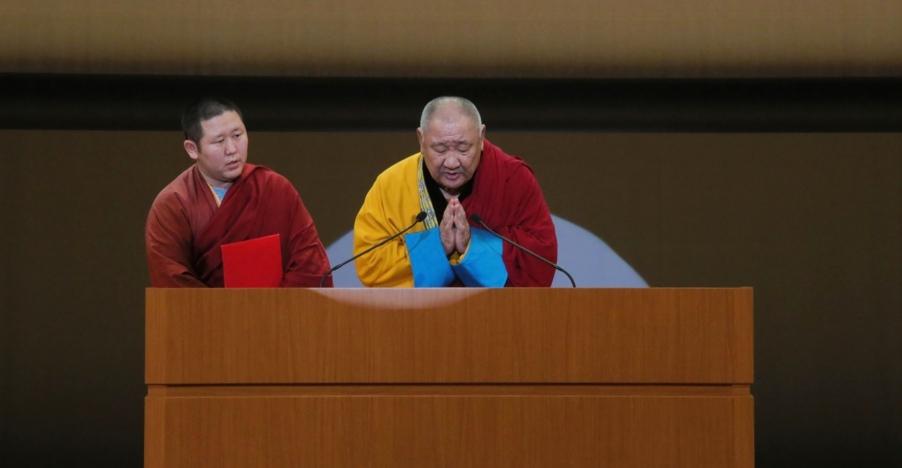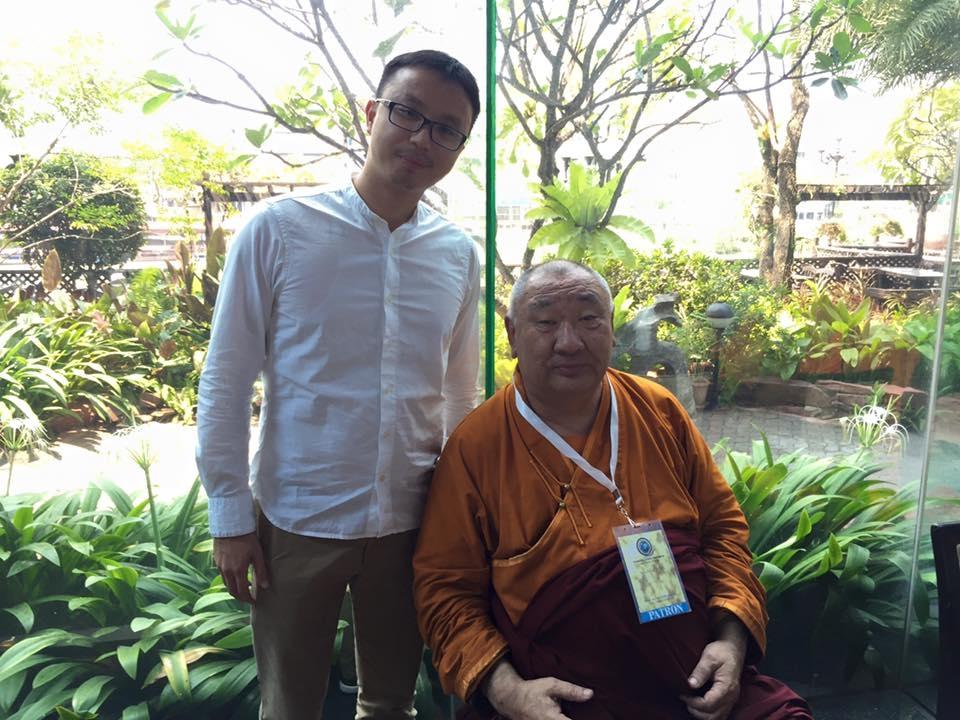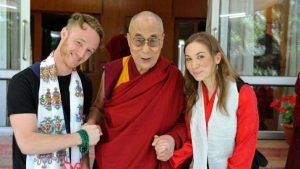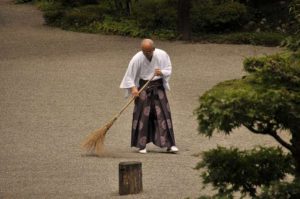
The highest-ranking Buddhist leader of Mongolia, who turns 60 this year, is worried. He is particularly worried about the growing materialism and intensifying activities of non-Buddhist missionaries in his country. Though we spoke through his translator, a lively and alert monk named Ven. Munkhbaatar Batchuluun, one could feel the weight and solemnity of his thoughts about his country’s traditional religion. His Eminence Khamba Lama Gabju Demberel Choijamts is one of the few Buddhist leaders I know who is not afraid to use the word “ideology” in a positive way. Experience has shown him how ideology can shape the circumstances and prospects of Buddhism, for good or ill.
As a member of the most senior committee of the International Buddhist Confederation (IBC), the Council of Patrons, he had come to Ayutthaya to attend the meeting of the governing council from 1–4 March. Since 1992, he has been the abbot (“khamba” in Mongolian, which is derived from the Tibetan “khenpo”) of Mongolia’s foremost monastery, Gandan Tegchenling, which was founded in 1809 and survived the country’s Communist era despite being closed from 1938–44. It was only nominally functional until 1990, when Mongolia transitioned into a new political system that allowed Mongolians to practice religion openly once more. This Gelug establishment remains the institutional center of Mongolian Buddhism.
Ordaining during the era of Communist rule and ascending to Mongolia’s most important ecclesiastical position just two years after its collapse were milestones that shaped His Eminence’s sense of religious traditionalism. “I was born in the countryside. My father was once a monk, and my grandmother was very devoted and pious. Our family was very serious about Buddhism,” he said as we sat outside the conference room where the governing council meeting was being held. “In the countryside, the government couldn’t check and censor people’s religious practice like they could in the cities.”
Even so, ordaining at the age of 19 right after high school was not easy during this period, and he attributes this fortune to karmic conditions and his own devotion. “Buddhism speaks of three kinds of freedom: body, speech, and mind,” he said. “The Communists could restrain our bodies and stop us going to temples. They could gag us or force us to stop talking about Buddhism. But . . . ,” he tapped his head, smiling. “They couldn’t enter our minds. This is how Buddhism was preserved in Mongolia.”
This knowledge seems to give him great pride, although in 2016, new challenges lie ahead. “Buddhism in my country is trending in the right direction,” he told me, “because a good opportunity presented itself when the Communist government ended. Buddhists seized the chance to propagate the Dharma and to practice the old ways. It is a similar story for formally Communist Vietnam and China. As religious freedom grows and Communist ideology softens or adapts, so does the room for Buddhist values to revive. But you have to know that there was a 70-year gap in our spiritual lives.”
His Eminence doesn’t take for granted that Mongolians see Buddhism as part of their traditional lifestyle and heritage. He estimated that while the majority of Mongolians claim to be Buddhist, all religions in Mongolia are in reality starting from a figurative Year Zero. In other words, the 70-year gap has done tremendous damage, in the physical sense of monks forcibly disrobed or murdered and temples closed down or demolished, and in the psychological sense of even the idea of the Buddhist tradition and inheritance being wiped from the Mongolian consciousness.
In this context, religious freedom after 1990 caught Mongolian Buddhism off-guard and at a severe disadvantage, as non-Buddhist religions, many of them well funded by foreign charities, churches, or governments, rapidly proliferated in Mongolia to take advantage of the ideological gap. “There is this interesting tendency,” said His Eminence, “of Mongolian and Asian youths wanting to be more Western. This might even mean converting to Christianity. They are gradually losing knowledge of their traditional culture, yet want to know more about Hollywood.”

The only solution he sees is education about both the past and Buddhism. However, there is a sense of calm urgency about him as one of his most important educational projects, the construction of a new university named after India’s supermonastery, Nalanda, near Ulaanbaatar has been repeatedly delayed because of the economic downturn currently gripping Mongolia. He has already sent 500 young monks to India for preliminary education before returning to this new university, yet building it will take ten years: “We will start soon,” he sighed, “despite the economic crisis.”
National upheaval, revolution, and the physical destruction of religious landmarks and institutions have always been nightmare scenarios for conservative-minded thinkers or supporters of established religion. His Eminence is likely not familiar with the many forms of political and philosophical conservatism, but like all thoughtful traditionalists he appreciates the inherited wisdom of religious tradition and the incredible damage its disruption can wreak on a society. However, the light at the end of the tunnel seems to be approaching. “Young people still have the tradition latent inside them, and there is always hope,” he said of the youth he had just critiqued. “It all depends on the elders and sanghas—they have to tell the truth and be more active in imparting our tradition’s knowledge and the urgency of preserving it.”
I asked him what ingredients are needed for the progress of Buddhism’s revival in Mongolia, which in His Eminence’s view means the retention and growth of what is left after Communist rule. He first echoed another Gelug leader, His Holiness the 14th Dalai Lama, arguing that more cooperation with scientists would help articulate the religion’s place in today’s world. “Generally, I say Buddhists are very scientific,” he said. “We are not allowed to believe something blindly without investigating. It is absolutely forbidden for someone to ask you to follow them without critical thinking.”
However, he also moderated his openness to scientific dialogue. “Modern science is about external development, but it cannot educate us about values. For example, if someone gets a PhD in science but has no inner values, he will be of no use and [may] even hurt others through his ego and materialism. He can make no contribution to society without loving-kindness and compassion,” he said, in almost word-for-word agreement with the Dalai Lama, who has spoken and written at length about the science versus values dichotomy. “Buddhism teaches the internal values of love and compassion. We need a revival of this everywhere.”
His Eminence possesses a mature, balanced outlook on religious traditionalism for a contemporary world. I am not surprised by this concordance of views (apart from the fact that they are both Gelug leaders). Buddhism’s staying power lies in its basic suppositions about reality, and the fact that all people are capable of attaining enlightenment and benefiting all beings. No other religion captures the pricelessness of human life in the same manner. The Dalai Lama has argued on various occasions and in several publications that believing in karma is absolutely crucial for the Buddhist’s moral worldview. And like the Dalai Lama, His Eminence believes that religious values are the foundation upon which an enlightened life of compassion and wisdom is built. He has further seen how a mere seven decades of revolutionary upheaval can uproot a philosophical and spiritual inheritance that has nourished the country’s people, culture, and history since the early 13th century. He and his followers are still picking up the pieces. I can only pray that they succeed.












